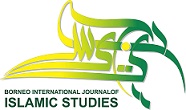KEDUDUKAN AS-SUNNAH DAN TANTANGANNYA DALAM HAL AKTUALISASI HUKUM ISLAM
Abstract
Sunnah of the Prophet Muhammad that had been understood by the majority of Muslims as role models; in the form of words, deeds / actions and the approval of the actions of others by the Prophet must always be understood in a dynamic and lively way. When Sunnah is understood as an ijtihad of the Prophet Muhammad in interpreting and applying the revelation / word of Allah in religious life and society, then following the sunnah of the Prophet became a major force in encouraging the creation of dynamic progress, inspiration and innovation. But if the sunnah of the Prophet is understood and translated literally, the sunnah of the Prophet are stuck in the classic texts which binds progressive mindset of Muslims. Therefore, on the conditions and the present situation, the Sunnah of the Prophet can no longer be understood and applied textually (classic) and deemed to be immutable, but it must be understood and applied contextually following the appropriate methodology and its subject matters. This is a necessity, because the Sunnah status is different from the Koran. Thus, the Sunnah is always open to be developed, equipped and even modified, so its application is easy and doable.
References
al-Bukari, Muhammad bin Ismail Abu Abdillah, Shahih Bukhari, Beirut-Libanon: Daar el-Kutub, 1981
Bin Hajjaj, Muslim, Shahih Muslim, Daar at-Thaibah, Libanon, 2006
Ghazali, Muhammad, Studi Kritik atas Hadits Nabi antara tekstual dan Kotekstual, Bandung: Mizan, 1998
Hanbal, Abu Abdillah Ahmad bin, Musnad Ahmad bin Hanbal, Juz I, Beirut: al-Maktabah al-Islamy, tt.
Kamali, M. Hasyim, Prinsip dan Teori-Teori Hukum Islam, Yogyakarta: Pustaka Pelajar, 1996
al-Khin, Musthofa Said, Sejarah Ushul Fikih, Jakarta: Pustaka al-Kautsar, 2014
Muhammad, Abul Harits, Memahami Kaidah Dasar Ilmu Hadits, Yogyakarta: Pustaka Pelajar, 2006
Mujiburrahman ”Membedah makna as-Sunnah dalam konsep kekinian”
Muslehuddin, Muhammad, Filsafat Hukum Islam dan Pemikiran Orientalis, Yogyakarta: PT. Tiara Wacana, 1997
Nurcholis, Madjid Pergeseran Pengertian Sunnah ke Hadits Implikasinya Dalam Pengembangan Syari’ah, Jakarta: Paramadina, 2006
al-Qarafi, Syihab al-Din, al-Ihkam fi Tamyiz al-Fatawa ‘an al-Ahkam, Beirut: Libanon, 1983
Radianti, Jaziar dan Entin Sariani Muslim, Menyoal Relevansi Sunnah Dalam Islam Modern, Bandung: Mizan, 2000
Rafiq, Ahmad, Studi Analisis atas al-Qur’an dan as-Sunnah Antara Tekstual dan Kontekstual, Yogyakarta: UIN Yogyakarta, 2011
Rahman, Fazlur, Membuka Pintu Ijtihad, Terj. Anas Mahyudin, Bandung: Pustaka, 1995
Al-Syatibi, Abu Ishaq, al-Muwafaqat fi Ushul al-Syari’ah, Beirut, Dar al-Fikr, 1975
Syahrur, Muhammad, Nahw Ushul al-Jadidah lil-Fiqh al-Islami, Damaskus: AL-Ahali, 1992
Shahih Muslim, hadis No. 2381, h. 107.
Shahih Muslim, hadis No. 2794, h. 119.
Sulaiman, Abu Daud, Sunan Abi Daud, Kairo: Dar el-Bayan al-Turats, 1988
Sunan an-Nasa’i, hadis no. 3962, h. 127.


.png)






